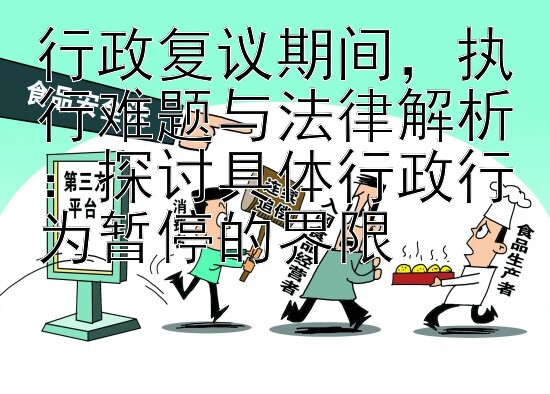在中国的法律体系中,行政复议是一种重要的救济途径,旨在纠正行政主体的错误或不当决定,保护公民、法人和其他组织的合法权益。然而,在实际操作过程中,如何平衡行政效率和法治原则之间的关系是一个复杂的议题,特别是在行政复议期间,关于是否应当以及何时暂停具体行政行为的实施存在一定的争议和挑战。本文将围绕这一话题展开讨论,分析行政复议期间的执行难题及其法律解析,并探讨具体的行政行为暂停的界限。
一、行政复议的基本概念及意义
行政复议是指行政机关根据上级机关或者专门的复议机构的指示,对下级机关的具体行政行为进行复查并作出裁决的活动。其目的是为了防止和纠正违法的或者不当的具体行政行为,保护公民、法人或者其他组织的合法权益。行政复议的意义在于提供了一个有效的渠道,使得受到不公正对待的个人或组织可以通过非诉讼的方式寻求救济,同时也促使行政机关依法行使职权,提高行政管理的透明度和公信力。
二、行政复议期间的执行难题
- 版
- 在实践中,当申请人提起行政复议申请后,行政复议机关通常会受理案件并进行审查。在此期间,被申请的具体行政行为往往不会立即停止执行。这是因为《中华人民共和国行政复议法》第二十一条规定:“行政复议期间具体行政行为不停止执行;但是,有下列情形之一的,可以停止执行:(一)被申请人认为需要停止执行的;(二)行政复议机关认为需要停止执行的;(三)申请人申请停止执行,行政复议机关认为其要求合理,决定停止执行的;(四)法律规定停止执行的。”因此,除非满足上述条件之一,否则具体行政行为将继续执行。
-
这种情况下,可能会出现以下几种执行难题:
- 权益损害:如果具体行政行为是错误的或不适当的,而它继续执行可能导致申请人遭受实际损失或权益侵害。
- 程序延误:即使最终行政复议的结果可能撤销或修改原具体行政行为,但在这之前的时间延迟可能会影响当事人的利益和权利。
- 司法资源浪费:如果在行政复议期间没有有效控制具体行政行为的执行,可能会导致后续的行政诉讼或其他法律程序,增加不必要的司法负担。
-
专业版
- In practice, once an applicant files a administrative review application, the administrative review authority usually accepts the case and conducts a review. During this period, the specific administrative act being reviewed generally does not stop execution. This is because Article 21 of the "Administrative Reconsideration Law of the People's Republic of China" stipulates: "During the administrative reconsideration period, the specific administrative acts shall not be suspended for execution; however, in the following circumstances, they may be stopped: (1) The party concerned deems it necessary to suspend execution; (2) The administrative reconsideration organ considers that suspension is needed; (3) The applicant applies for suspension, and the administrative reconsideration organ believes that his request is reasonable and decides to suspend; (4) Laws provide for suspending implementation. Therefore, unless one of these conditions is met, the specific administrative action will continue to be executed.
- Under such circumstances, several difficulties in enforcement might arise:
- Damage to Interests: If the specific administrative action is erroneous or inappropriate, its continued execution could lead to actual losses or infringements on the rights of the applicants.
- Procedural Delay: Even if the final outcome of the administrative review may revoke or modify the original specific administrative action, the delay before that could affect the interests and rights of the parties involved.
- Waste of Judicial Resources: Without effective control over the execution of specific administrative actions during the administrative review process, subsequent litigation procedures such as administrative lawsuits or other legal proceedings might occur, which would increase unnecessary judicial burdens.